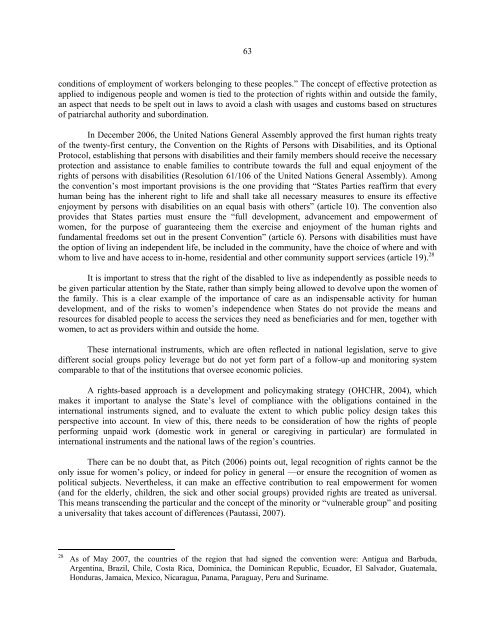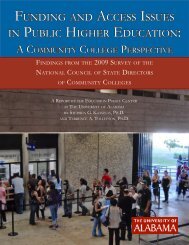Women in Latin America and the Caribbean - Cepal
Women in Latin America and the Caribbean - Cepal
Women in Latin America and the Caribbean - Cepal
You also want an ePaper? Increase the reach of your titles
YUMPU automatically turns print PDFs into web optimized ePapers that Google loves.
63<br />
conditions of employment of workers belong<strong>in</strong>g to <strong>the</strong>se peoples.” The concept of effective protection as<br />
applied to <strong>in</strong>digenous people <strong>and</strong> women is tied to <strong>the</strong> protection of rights with<strong>in</strong> <strong>and</strong> outside <strong>the</strong> family,<br />
an aspect that needs to be spelt out <strong>in</strong> laws to avoid a clash with usages <strong>and</strong> customs based on structures<br />
of patriarchal authority <strong>and</strong> subord<strong>in</strong>ation.<br />
In December 2006, <strong>the</strong> United Nations General Assembly approved <strong>the</strong> first human rights treaty<br />
of <strong>the</strong> twenty-first century, <strong>the</strong> Convention on <strong>the</strong> Rights of Persons with Disabilities, <strong>and</strong> its Optional<br />
Protocol, establish<strong>in</strong>g that persons with disabilities <strong>and</strong> <strong>the</strong>ir family members should receive <strong>the</strong> necessary<br />
protection <strong>and</strong> assistance to enable families to contribute towards <strong>the</strong> full <strong>and</strong> equal enjoyment of <strong>the</strong><br />
rights of persons with disabilities (Resolution 61/106 of <strong>the</strong> United Nations General Assembly). Among<br />
<strong>the</strong> convention’s most important provisions is <strong>the</strong> one provid<strong>in</strong>g that “States Parties reaffirm that every<br />
human be<strong>in</strong>g has <strong>the</strong> <strong>in</strong>herent right to life <strong>and</strong> shall take all necessary measures to ensure its effective<br />
enjoyment by persons with disabilities on an equal basis with o<strong>the</strong>rs” (article 10). The convention also<br />
provides that States parties must ensure <strong>the</strong> “full development, advancement <strong>and</strong> empowerment of<br />
women, for <strong>the</strong> purpose of guarantee<strong>in</strong>g <strong>the</strong>m <strong>the</strong> exercise <strong>and</strong> enjoyment of <strong>the</strong> human rights <strong>and</strong><br />
fundamental freedoms set out <strong>in</strong> <strong>the</strong> present Convention” (article 6). Persons with disabilities must have<br />
<strong>the</strong> option of liv<strong>in</strong>g an <strong>in</strong>dependent life, be <strong>in</strong>cluded <strong>in</strong> <strong>the</strong> community, have <strong>the</strong> choice of where <strong>and</strong> with<br />
whom to live <strong>and</strong> have access to <strong>in</strong>-home, residential <strong>and</strong> o<strong>the</strong>r community support services (article 19). 28<br />
It is important to stress that <strong>the</strong> right of <strong>the</strong> disabled to live as <strong>in</strong>dependently as possible needs to<br />
be given particular attention by <strong>the</strong> State, ra<strong>the</strong>r than simply be<strong>in</strong>g allowed to devolve upon <strong>the</strong> women of<br />
<strong>the</strong> family. This is a clear example of <strong>the</strong> importance of care as an <strong>in</strong>dispensable activity for human<br />
development, <strong>and</strong> of <strong>the</strong> risks to women’s <strong>in</strong>dependence when States do not provide <strong>the</strong> means <strong>and</strong><br />
resources for disabled people to access <strong>the</strong> services <strong>the</strong>y need as beneficiaries <strong>and</strong> for men, toge<strong>the</strong>r with<br />
women, to act as providers with<strong>in</strong> <strong>and</strong> outside <strong>the</strong> home.<br />
These <strong>in</strong>ternational <strong>in</strong>struments, which are often reflected <strong>in</strong> national legislation, serve to give<br />
different social groups policy leverage but do not yet form part of a follow-up <strong>and</strong> monitor<strong>in</strong>g system<br />
comparable to that of <strong>the</strong> <strong>in</strong>stitutions that oversee economic policies.<br />
A rights-based approach is a development <strong>and</strong> policymak<strong>in</strong>g strategy (OHCHR, 2004), which<br />
makes it important to analyse <strong>the</strong> State’s level of compliance with <strong>the</strong> obligations conta<strong>in</strong>ed <strong>in</strong> <strong>the</strong><br />
<strong>in</strong>ternational <strong>in</strong>struments signed, <strong>and</strong> to evaluate <strong>the</strong> extent to which public policy design takes this<br />
perspective <strong>in</strong>to account. In view of this, <strong>the</strong>re needs to be consideration of how <strong>the</strong> rights of people<br />
perform<strong>in</strong>g unpaid work (domestic work <strong>in</strong> general or caregiv<strong>in</strong>g <strong>in</strong> particular) are formulated <strong>in</strong><br />
<strong>in</strong>ternational <strong>in</strong>struments <strong>and</strong> <strong>the</strong> national laws of <strong>the</strong> region’s countries.<br />
There can be no doubt that, as Pitch (2006) po<strong>in</strong>ts out, legal recognition of rights cannot be <strong>the</strong><br />
only issue for women’s policy, or <strong>in</strong>deed for policy <strong>in</strong> general —or ensure <strong>the</strong> recognition of women as<br />
political subjects. Never<strong>the</strong>less, it can make an effective contribution to real empowerment for women<br />
(<strong>and</strong> for <strong>the</strong> elderly, children, <strong>the</strong> sick <strong>and</strong> o<strong>the</strong>r social groups) provided rights are treated as universal.<br />
This means transcend<strong>in</strong>g <strong>the</strong> particular <strong>and</strong> <strong>the</strong> concept of <strong>the</strong> m<strong>in</strong>ority or “vulnerable group” <strong>and</strong> posit<strong>in</strong>g<br />
a universality that takes account of differences (Pautassi, 2007).<br />
28<br />
As of May 2007, <strong>the</strong> countries of <strong>the</strong> region that had signed <strong>the</strong> convention were: Antigua <strong>and</strong> Barbuda,<br />
Argent<strong>in</strong>a, Brazil, Chile, Costa Rica, Dom<strong>in</strong>ica, <strong>the</strong> Dom<strong>in</strong>ican Republic, Ecuador, El Salvador, Guatemala,<br />
Honduras, Jamaica, Mexico, Nicaragua, Panama, Paraguay, Peru <strong>and</strong> Sur<strong>in</strong>ame.











